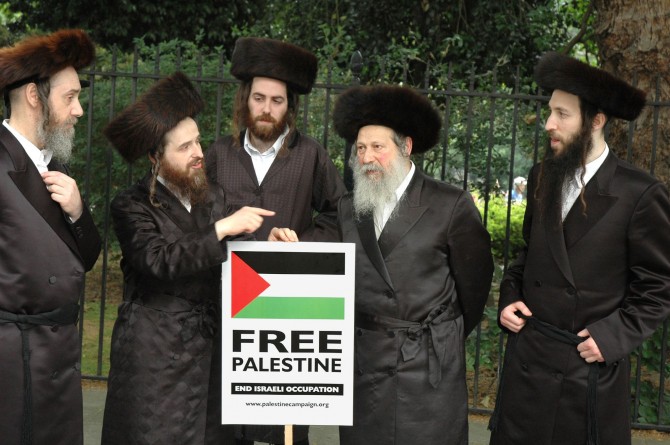
Two day later, a similar expression of anger occurred in Washington outside the Israeli embassy, with a number of Jewish protestors calling for the recognition of Benjamin Netanyahu as a war criminal. These people also ended up detained, this time, for simply refusing to leave when told to by the authorities.
From this sprang the important factor of Jewish dissent to Israel’s actions, which received scarcely any coverage in America’s media outlets save for The Nation. Instead, such groups came up against the argument that their case for Palestinian justice was but a minor fraction of Jewish opinion, while the vast majority apparently believe the Gaza assaults to be a just battle between ‘good’ and ‘evil’.
That last quote came from an op-ed published in the Algemeiner on September 1st. In said article, Irwin Graulich, an Israeli motivational speaker, launched a scathing attack on such Jewish voices, but in particular, a group of 327 Holocaust survivors and their relatives for taking out an advert in The New York Times that lamented the ‘extreme racist dehumanisation of Palestinians in Israeli society’. He sought to diminish their claims, first by pointing that only 14 actually had genuine experience in the concentration camps, while 26 were either babies, or too young to appreciate the event and true meaning of Zionism. Following this up by labelling them ‘traitors’, he then proceeded to add to the notion that Zionism and Judaism are a single entity.
The observation was wholly counterproductive, only continuing to stoke the flames of the crisis for both Palestinians and the apparently self-hating Jews living outside Israel, now enduring a new onset of anti-semitic attacks across Europe at present, regardless of their actual political viewpoint. These violent mobs have been able to use such vicious rhetoric to strengthen their case, while mobilising under the guise of pro-Palestine organisations, exploiting vulnerable Muslim lower-class opinions, particularly in France.
This came up in a conversation that I had with an Israeli friend who had recently returned to New York, following a lengthy stay in the city of Acre, bringing to my attention the scale and detrimental effect of this reaction. We met up at a bar in Manhattan’s lower east side, an area densely populated by Hasidic Jewish families, quite a significant number of whom have taken to the streets to air their grievances against the Knesset, brandishing signs stating that they stand with the Palestinians.
My friend was clearly distressed as she described how her gentile friends often addressed her as if she were a Netanyahu sympathiser and though she expressed her profound adoration for the country, the recent turn of events left an underlying cynicism in her every word. Of course, she said, it was heartbreaking to learn of the ever-mounting body count in Gaza, but there was a tendency by many to discount the deaths on one side, weighing the two in opposition, as opposed to counting each and every life in and of itself. Explaining what she meant by this, she told me that one of her close friends had been amongst the over 70 IDF soldiers killed during the ground assault.
Following this up, she said that, in France, another group of her friends had found themselves with little other option than to migrate to Israel as a new wave of right-wing thugs were thriving in this global political climate, reviving anti-Semitic thought across the country with relative ease.
Apparently, in Paris there were signs outside cafés reading “No pets, no Jews”, while similar occurrences have been reported in Belgium since early August. On a more worrying level, this has escalated from discrimination into fully-fledged attacks with the firebombing of synagogues in Sarcelles, Paris; Bergische in Wuppertal and the daubing of swastikas on Jewish shops in Italy. These misrepresentations of the Palestinian cause, in the case of France are stemming from neo-Nazi grassroots organisations that provoked the French government to outlaw protests, due to the rise in fascist slogans and chants appearing at anti-Israeli rallies. The issue seems to have sprouted from disillusioned and marginalised Muslim areas of society, which do not necessarily hate Israel, but are reacting against Hollande’s government by any means possible.
With such sections of French society inflamed and manipulated by hard-line right wingers, it heralds another repeat of oversimplified historic misinterpretation echoing back to when Hitler was able to exploit the Grand Mufti of Jerusalem, Haj Amin al-Husseini during the initial mass migration of Jewish people to Palestine in the 1930s and ’40s. In much similar a fashion, former Front Nationale and outright neo-Nazi organisations have been able to exploit a mood, giving credence to the notion that all pro-Palestine voices are therefore anti-semitic and ergo, anti-American.
If there is anything that can be taken from this situation, then it ought to be the fact that the mobilising anti-semites do not hold any interest in the well-being of Palestinians. Instead, their ambition is to oust vast swathes of each local Jewish population, much to the approval of Israel’s Zionist supporters, which in turn gives further justification for expansion into Gaza and the West Bank. This is the casting of more petrol onto the bonfire, keeping the vicious circle going on ad infinitum.






